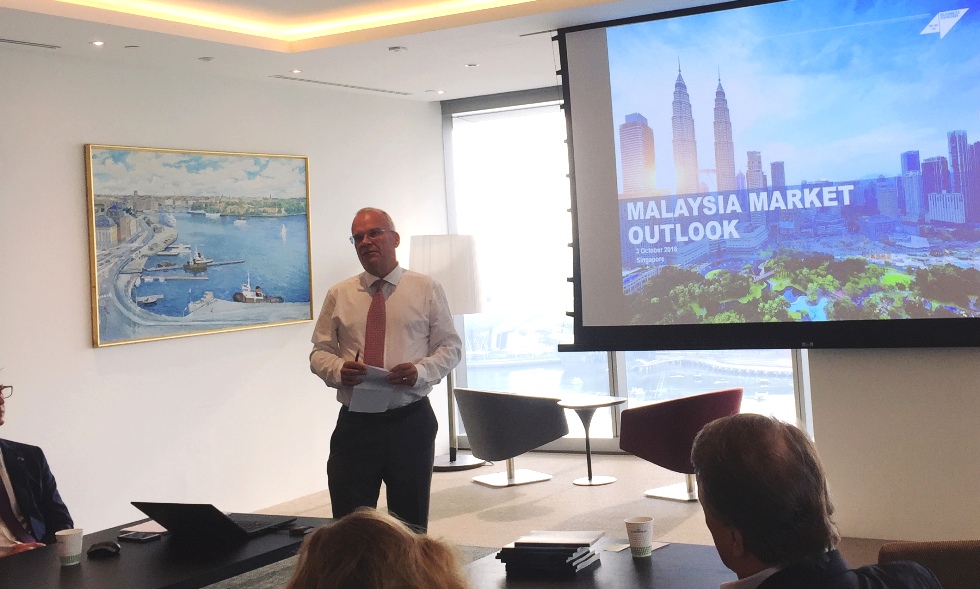Based on insights from Swedish companies on the ground Business Sweden has launched the Business Climate Survey Malaysia 2018. The report presents an aggregated picture of the Malaysian market from the point of view of Swedish companies present there.

“The Malaysian spring has indeed been eventful; a historic win in the general election by the opposition alliance led by the country’s former leader, Mahathir Mohamad, ended the ruling party’s 60-year-old grip on power. The political turbulence can contribute to some short-term uncertainty but most indicators suggest that Malaysia will grow stronger and continue its progress to a high-income country,” writes Emil Akander, Acting Trade Commissioner of Sweden to Malaysia.
“Understanding where the political and economic situation is headed in Malaysia is not easy. We believe that input from the Swedish players on the market on their expectations and intentions is an important complement to other sources of information and analysis.”
Insights from those with boots on the ground constitute an important complement in the decision-making, Business Sweden argues.
“The Malaysian economy has shown a remarkable strength throughout the last decade, growing by an average of 5% per year since 2008. Many argue that the general election upset, although it will create some short-term uncertainty, gives Malaysia the possibility to finally start to tackle some of the institutional problems that are holding back the country’s long-term prospects,” Emil Akander furthermore states in his summary.
The survey took place in late April/May 2018, and was thus conducted before the general election held in May. The report represents a diversified and representative sample for the Swedish business in Malaysia covering most company groups represented on the market.
29 companies participated of which 59 % represent large global corporations. Almost a quarter of respondents don’t have a legal entity in Malaysia, being present on the market via partner (e.g. JV, agent, distributors).
44% of the respondents got established in Malaysia between year 1957 – 2000 and it took 18 years to more than double that amount of companies entering the Malaysian market. The Majority of the surveyed companies are present in order to sell their products/services to the local market.
Swedish companies have a positive market outlook and are planning to invest further. 90 % plan to invest in the next three years.
A majority of the companies (62%) are expecting revenue growth numbers of more than 10% for the coming years. A high degree of respondents indicate that they will invest in ‘Marketing & Sales’ (55%). This may be related to the notion that Malaysians are quite brand-conscious.

83 % expect revenues to grow the in the next three years while 62 % expect positive profit margins. Of the surveyed companies, 69% report a positive historic growth while 83% project positive growth. This positive outlook is shared within most industries and company sizes. Small companies are the most optimistic, closely followed by major companies.
The increased optimism is linked to Malaysia’s strong employment number that is boosting private consumption, while investment is also helping to drive growth, states the report.
The strongest revenue projections by the surveyed companies are within the ‘Automotive & Transport’ sector.
While they project revenue growth, the surveyed companies expecting lower profit margins going forward in general.
Malaysia’s business-friendly and market-oriented economy (ranked globally in World Bank´s latest Ease of doing business ranking), in combination with supportive government policies and a large local business community, are attracting foreign investments and, concurrently, increasing the intensity of competition (however, there are still some bureaucratic hinders).
The New Economic Model (NEM) launched in 2010 by the government in order to “shift (the economy) to a higher level of value added and productivity” with related initiatives for productivity and sustainability is attracting an increasing number of foreign companies.
For the past several years China has increased its presence in Malaysia coming in with large investments. This has increased the competition and set a downward pressure on the price levels and thus profit margins.
Price sensitivity and competition are highlighted as the key challenges for market success. The Malaysian customers are, in general, price sensitive.
As for in any market, it is important to communicate the unique selling points and values , and that must be tailor-made to fit the local clients. Due to the high diversity in the country´s demographics, demonstrating cultural sensitivity, tact and understanding of the market gap builds trust.
‘Competition’ is not considered a key challenge within ‘Business Services’, ‘ICT’ and ‘Industrial Equipment.
On the positive side Malaysia offers: a cost-efficient market, strategic location and a well developed valued chain.
‘Finding skilled labour’ is considered a key challenge within industry-heavy sectors such as ‘ICT’ and ‘Automotive & Transport’, suggesting an under-supply of qualified engineers. The positive GDP projection is likely to lead to a corresponding increment in talent demand, particularly within the technology sector.
Demand for mid-to high-level employees with digital skills, such as software programming and data analytics, is increasing fast. In a talent-short market (unemployment rate averaging between 3.2-3.7% last 10 years), this means that competition for high-quality candidates will, most likely, become even tougher.
A challenge for the Malaysian economy is also the need to increase productivity to stay competitive. This is creating the demand for investments in productive and innovative Swedish products and services – an opportunity to take advantage of, states the report.
79% of the surveyed companies indicate that the Swedish brand is perceived positively in Malaysia (the rest, 21%, neutral).

The Swedish brand is associated with innovative products and services, which are strong differentiators in the Malaysian market. These should be highlighted, recommends Business Sweden. And while keeping the Swedish brand image, the value offering should be localized to gain the confidence of local customers.
Swedish businesses should also show that they care about the Malaysian market by sharing expertise within sustainability and innovation.
“Swedish companies operating in Malaysia increasingly differentiate themselves by showing their commitment to the local market, such as carrying out corporate social responsibility programs that contributes to the community, job creation and other added value.”
Malaysia is well-positioned, both with regards to geography and cost structure, for continued growth and Swedish businesses
Embedded in the middle of the ASEAN region, Malaysia’s strategic location and competitive position make it an attractive for destination to set up regional hubs and similar.
Malaysia has a low-cost base with workers 25% of what their counterparts earn in neighbouring Singapore. The country remains strongly focused on assembly, testing, design, and development involved in component parts.
“Looking at the aggregated market characteristics and input from the Swedish companies present in the market, we can conclude that the business opportunities are vast and the optimism for the future is big,” concludes Emil Akander.
As the survey was presented on 3 October in Singapore the Swedish Ambassador to Malaysia, Dag Juhlin-Dannfelt commented: “There is great interest for Malaysia among Swedish corporations in Singapore. With more transparency, accountability & good governance, Malaysia’s attraction for investments will increase. Rule of law, transparency, and social and political stability are good for business & investments.”
“There are defined opportunities in the areas such as Smart Manufacturing & Smart Cities where Swedish companies are already seen as a role model & key partner for value add creation. The country’s strong commitment to implement a digital agenda will further trigger demand for new technologies & innovative companies,” said Kacper Pierzynowski, Project Manager at Business Sweden Malaysia.
Source: Business Sweden
